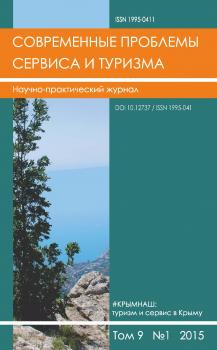Simferopol', Simferopol, Russian Federation
In the article the authors give a brief characteristic analysis of the recreational and other resources, the potential of the recreational appeal of the Peninsula in general, which under the conditions of Crimea staying in Ukraine was left not realized. The structural reorganization of Ukraine, begun more than twenty years ago, led to the collapse of the sanatorium and health resort complex of Crimea, which in recent past used to be a powerful health resort base, named the АН-Union Health Center. The revival of the health resort and recreation sphere of Crimea under new conditions is the most important social task and essential segment of the economy development, which urgently needs the provision of the competitive advantagesfor the national subjects of the economic activity at the domestic and international market. There is a substantiated possibility and necessity of using the potential in practice under new, Russian conditions of the economic management by means of creating new organizational form of functioning sanatorium and health resort enterprises (SHREs). The authors prove that the perspective of such form of organizing production of enterprises is the integration of cluster associations on the basis of cooperation both among the SHREs themselves, and other related enterprises, establishments, organizations, which take part in producing sanatorium and health resort products. Cluster associations, unlike the enterprises working alone, SHREs, are more efficient, and they are able not only to survive together, but also to remit a part of funds for restoring natural and anthropogenic recreational resources and by this to preserve the unique appeal of the destinations. A logical model of the formation of health resort clusters of destinations is suggested, which is focused on the improvement of accessibility of the general public in accordance with the objectives of the state social tourism policy.
clusters of health resort destinations, formation, model, development
С возвращением в Россию крымчане обрели надежду на поступательное и динамичное развитие всех ведущих отраслей экономики своего полуострова, в т.ч. и рекреационной сферы. Рекреационная привлекательность Крыма как традиционной туристской дестинаций не вызывает сомнений. Это уникальное природно-климатическое, ресурсно-антропогенное образование с благоприятными условиями развития конкурентоспособного и диверсифицированного санаторно-курортного и туристского секторов региональной экономики.
Главными природными рекреационными ресурсами (РР) региона являются уникальные климатические условия, пляжи,
лечебные грязи, источники различных минеральных вод (бальнеологические ресурсы), объекты природно-заповедного фонда, пейзажные ресурсы, спелеоресурсы и др. Однако доля вовлечения в рекреационную деятельность имеющегося потенциала незначительна — в систему экскурсионного обслуживания РК включено, по разным оценкам, лишь до 50% возможных природных объектов [1, с. 13].
На территории Крымского федерального округа (КФО) находятся более 11,5 тыс. памятников истории, культуры, архитектуры, из которых около 150 историко-ар-хитектурных объектов внесены в каталоги ЮНЕСКО. Однако разрушение и неудовлетворительное состояние объектов исто-
1. Strategiya ekonomicheskogo i sotsial´nogo razvitiya Avtonomnoy Respubliki Krym na 2011-2020 gody / Sovet ministrov ARK, Natsional´nyy institut strategicheskikh issledovaniy. Ut-verzhd. VR ARK №121-6/10 ot 22.12.10. http://www.minek-crimea.gov.ua/content.phpPcicbStrategy (data obrashcheniya: 10.01.2015).
2. Konstitutsiya Rossiyskoy Federatsii (prinyata referendumom 12.12.1993) (red. ot 30.12.2008). http://zakonbase.ru/konstitucija-rf (data obrashcheniya: 05.11.2014).
3. Voynarenko M.P. Klasteri v іnstitutsіynoї ekonomіtsі. Khmel´nits´kiy: KhNU, TOV «Trіada-M», 2011. 502 s.
4. Kurteva T. Neprostoy opyt organizatsii klasterov//Dіloviy vіsnik. 2009. №10. S. 10-12.
5. Zdravnitsy Evpatorii stanut edinym klasterom, http://sankurtur.ru/news/4450/ (data obrashcheniya: 14.02.2012).
6. Federal´nyy zakon Rossiyskoy Federatsii ot 29 noyabrya 2014 g. №377-F3 «O razvitii Krymskogo federal´nogo okruga i svobodnoy ekonomicheskoy zone na territoriyakh Respubliki Krym i goroda federal´nogo znacheniya Sevastopolya», http://www.rg.ru/2014/12/03/krym-dok.html (data obrashcheniya: 14.01.2015).
7. Postanovlenie Pravitel´stva RF ot 11 avgusta 2014 g. №790 «Ob utverzhdenii federal´noy tselevoy programmy «Sotsial´no-ekonomicheskoe razvitie Respubliki Krym i g. Sevastopolya do 2020 goda». http://www.garant.rU/products/ipo/prime/doc/70614732/#ixzz3NupuCPBO (data obrashcheniya: 14.01.2015).
8. Sovet ministrov Respubliki Krym o gosudarstvennoy programme «Razvitie turizma i kurortov v Krymu na 2015-2017 gg.». http://news.allcrimea.net/news/2014/12/9/na-razvitie-turizma-v-krymu-potratyat-pochti-desyat-mlrd-rublei-27037/ (data obrashcheniya: 12.01.2015).
9. Vetitnev A.M., Zhuravleva L.B. Kurortnoe delo. M.: KNORUS, 2006. 528 s.
10. Kizim A.A., Val´vashov A.N., Saydasheva O.V. Metodologicheskie aspekty povysheniya ustoychivosti regional´noy ekonomiki na osnove prodvizheniya turistskikh destinatsiy. Ekonomika ustoychivogo razvitiya. 2012. №10. S. 102-115.
11. KotlerP. Marketing Place. NY.: Free press, 1993. 367 p.
12. Nikitina O.A. Issledovanie protsessov funktsionirovaniya i strategicheskogo razvitiya regional´nykh sanatorno-kurortnykh kompleksov. - SPb.: Izd-vo Politekhi, un-ta, 2009.163 s.
13. Minaev V.A., Platonova N.A., Pogrebova E.S. Metodika analiza kachestva regional´noy infrastruktury industrii turizma i turisticheskogo servisa. Vestnik Assotsiatsii vuzov turizma i servisa. 2014. Vyp. 8. №2. S. 38-47.
14. Tkachenko T.I. Staliy rozvitok turizmu: teorіya, metodologіya, realії bіznesu. - K.: Kiїv. nats. torg.-ekon. un-t, 2009. 537 s.
15. Vasil´ev A.V. Problemy proektirovaniya turistskikh klasterov i sovremennye tekhnologii ikh modelirovaniya. Problemy sovremennoy ekonomiki. №3(43). 2012. S. 329-332.
16. Karpova E.G., Kostryukova O.N. Metody identifikatsii turistskikh klasterov v sisteme regional´nogo turizma. Problemy sovremennoy ekonomiki. 2011. Vyp. №4(40). S. 374-378.
17. Kunіtsin SV. Mekhanіzm upravlіnnya rozvitkom pіdpriєmstv turistichno-rekreatsіynoї sferi. Sіmferopol´: KRP «Vidavnitstvo «Krimnavchpedderzhavvidav», 2012. 454 s.
18. Levchenko T.P., Kulyan K.K., Kulyan M.K. Klasternyy podkhod k ustoychivomu razvitiyu turistskikh destinatsiy. Vestnik SGUTiKD. 2012. №2(20). S. 67-72.
19. Poztez M.E. Clusters and the New Economics of Competention. Harvard Bnziness Review. 1998. Nov.-Dec. P. 77-90.
20. Emel´yanov B.E. Struktury mezhdunarodnogo biznesa. Murmansk: Izd-vo MGTU, 2008. 88 s.





